GRANDMA’S A BADASS
It’s Grandma Maria Porkalob Sr.’s 60th birthday party, she’s living in her son’s mother-in-law basement and he’s just given her a karaoke machine as her birthday present. She’s about to fire it up to tell granddaughter Sara Porkalob her dramatic life story. Upstairs, her birthday is being both celebrated by most of her family but criticized by her daughter.
Dragon Lady, Sara’s one-woman, tour-de-force performance honoring this badass matriarch, opened last night at the Geffen Playhouse. Directed by Andrew Russell, Sara brings grandma’s story to life across three generations of Filipino women and a total of 19 family members, all of whom she portrays herself.
And what exactly is a “dragon lady”? It’s the stereotype of a South East or East Asian woman, who is strong, mysterious and sexually alluring. No doubt about it, this granny qualifies on all counts.
As a child, Maria’s father was murdered by the toughest gang in the Philippines, leaving her to fend for herself. She lands in Manila, cleaning a gang-run night club/brothel, where after 10 years the proprietor “discovers” her; she has grown into a beautiful young woman who can sing even more beautifully. The proprietor regards her now as an “investment.”
The proprietor puts her onstage, where she attracts the attention of the gang’s handsome boss. She is easily seduced, and naively believes he loves and will marry her. Instead, he impregnates her, demands to keep the daughter (also named Maria) himself and steals her away. But Maria won’t stand for that, so she goes to rescue her daughter, killing the gang leader.
Redemption comes in the form of an American naval man with the Hungarian name Porkalob. But to leave with him, she must cut a deal with the devil – the proprietor says she must “entertain” a Chinese client before she lets Maria go.
Porkalob marries her, knowing she already has one daughter, and whisks her off to Bremerton, Washington. After a wedding and honeymoon in Hawaii she is now pregnant again. But Porkalob’s mother questions whether that child could be his, since Maria’s much bigger than a 6-month pregnancy would indicate.
She will raise her five children in a trailer park, in poverty and hunger, both with and without him, taking whatever jobs she can find to keep the lights on and keep the kids fed, neither of which she does particularly well.
It falls to young Maria (the daughter) to look after the family, setting up a life-long resentment between mother and daughter for mother’s frequent absences. Daughter Maria never understood the fact that her mother was trying to do her best, taking any job she could to support the family. When she disappears for two weeks, thinking she would be receive a new marriage proposal that did not come to pass, young Maria will not forgive her.
Act I focuses on Maria Sr.’s back story, and Act II mostly covers the trials and tribulations of the five siblings and concludes with Sara’s moving epilogue, thanking her grandmother for sharing the true story of her life as an inspiration for her own.
Watching Sara inhabit so many characters at head-spinning speed is nothing short of remarkable. She slips seamlessly in and out of the two Marias, Ronald Porkalob Sr. and Jr., the sons and the daughters, the gang leader, the club proprietor, and more, without losing a beat.
And can she ever sing! There’s the karaoke music, with Maria Sr. changing the lyrics to “House of the Rising Sun” to reflect her own story, the cabaret trio of live musicians in a screened off space to the side of the stage (including bandleader Peter Irving on guitar and vocals, Jimmy Austin on trombone and Mickey Stylin on upright bass) performing some jazzy tunes, torch songs and original music, including the “Dragon Theme,” and “Trouble Is a Family Trait.”
It’s a truly superb performance on so many levels, at a high-pitched energy. And the stage is flat out gorgeous. The set by Randy Wong-Westbrooke transforms from the basement where Maria Sr. lives into the Manila nightclub where she sang, and our imaginations help us see the trailer in which the kids are crammed.
Set off in hot red colors, we see the karaoke machine at the center, the curved sofa/banquette to the right, to the left a bar with turquoise tufted bar stools, a small, curvy railed staircase, massive red curtains draped from the ceiling, the vaguely “Chinese” looking cabinetry, all framed by the massive, scaly, dragon-tail proscenium that changes colors at strategic moments from brilliant red to turquoise to orange, as lit by Spence Matubang.
One of the lyrics has Maria singing, “I wish I could tell you that you are no child of pain. But you have my blood in your veins, and trouble’s a family trait.” But this badass grandma also says to herself, “I am a fierce, independent feminist. I can do this! Even though that word hasn’t been invented yet.”
Sara Porkalob turns that pain into a powerful stage performance and tribute to her grandmother, who used to come out at the end as part of the show. Now deceased, she’s remembered instead by a photograph, including birth and death years, onto the back of the stage.
photos by Jeff Lorch
poster photo by Justin Bettman
Dragon Lady
Geffen Playhouse, 10866 Le Conte Avenue in Westwood
Wed-Fri at 8; Sat at 3 & 8; Sun at 2 & 7
ends on October 6, 2024
for tickets (starting at $39), call 310.208.5454 or visit Geffen Playhouse
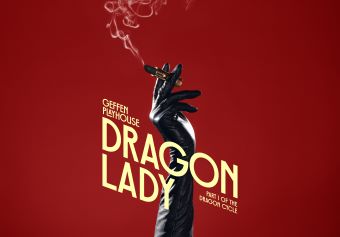
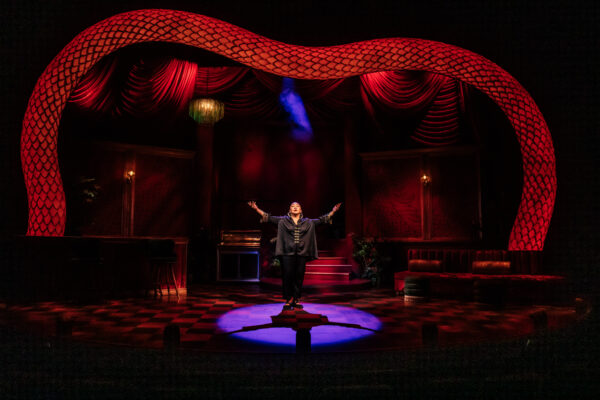
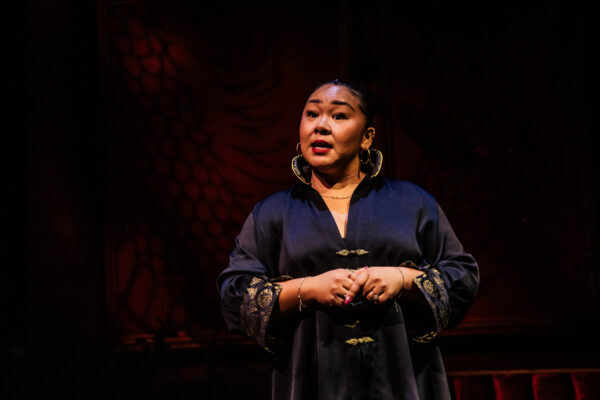
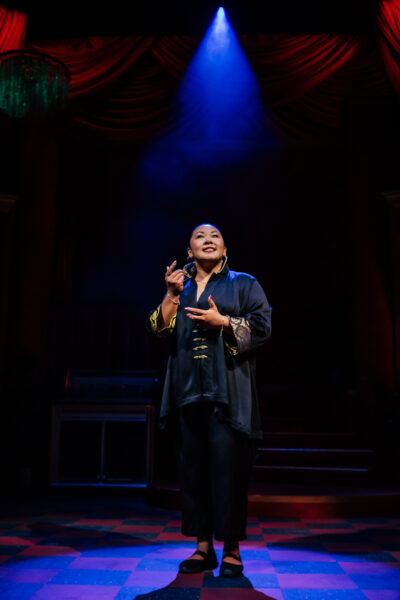
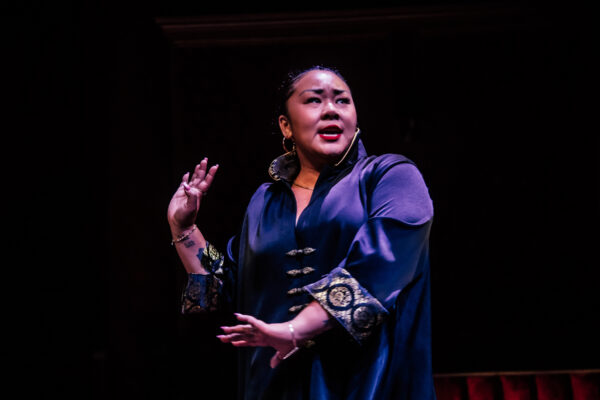
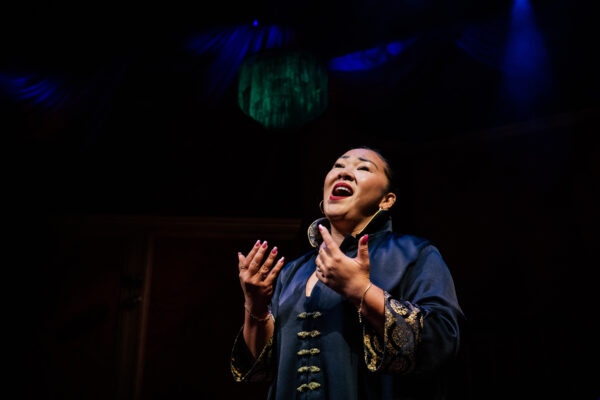
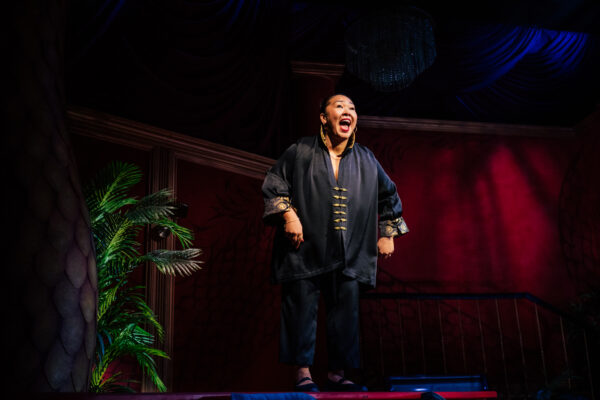

{ 1 comment… read it below or add one }
Ms. Porkalob is very likeable on stage and gives a wonderful and heartfelt performance… although the differentiation between the many characters is slight (and sometimes quite amateurish) to say the least. The fact that several of them are named Maria doesn’t help keep them straight either. In addition she has a beautiful singing voice and the 3 musicians provide excellent back-up. Unfortunately the script is in need of some very judicious trimming. Parts of her story are simply not interesting enough to justify the time and words devoted to them. Instead of the slightly over 2 hour slog we get … a straight through intermission free 60-70 minutes would have done the trick. The set, while amazing, is total overkill. It looks like the lounge of a fancy Chinese restaurant. All that is really needed is the neon “Dragon Lady” sign and a black background. It’s Ms. Porkalob’s job to keep us interested …not the red velvet foot stools. In these days of tight theatrical budgets I kept thinking it was a total waste of money. The Geffen loves to throw money at the sets …sometimes appropriately (Key Largo) and sometimes not so much ( the final 2 minute outrageous disco transformation in TRAYF). If you decide to see this show you will be mildly amused and entertained … if you decide to skip it you will still have a full life!